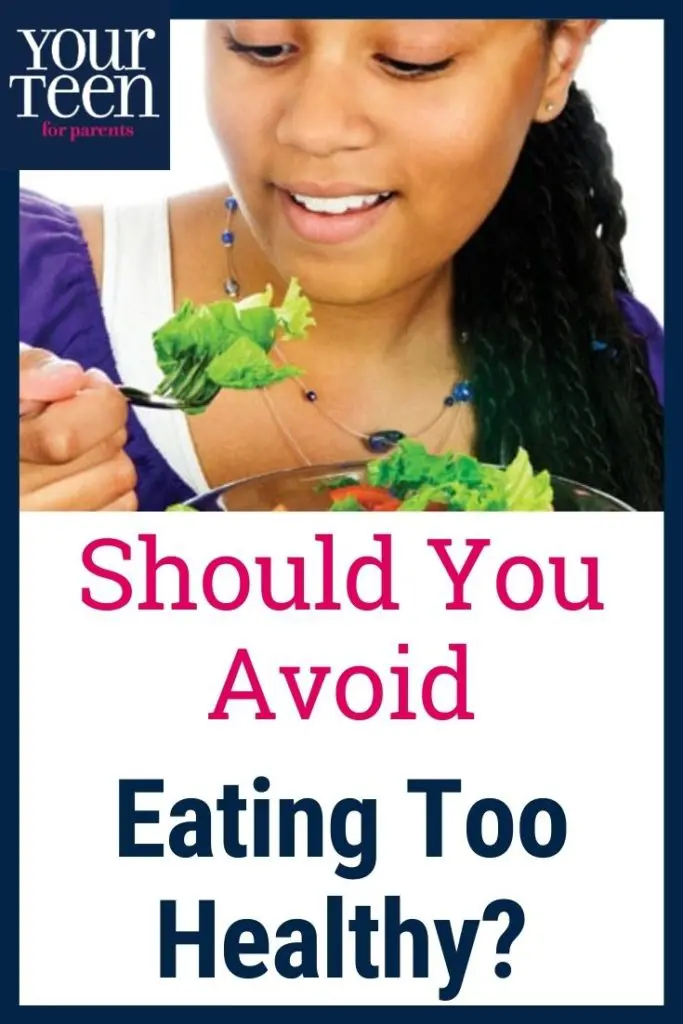“Mom, I really want to start eating healthier. Can I come to the grocery store with you?”

It’s music to any parent’s ears. Most parents are thrilled when their teen demonstrates increased independence and a proactive, no-nagging-required approach to self-care. But when it comes to dietary changes, a focus on “clean eating” for wellness can generate food fears and dangerous black-and-white thinking.
A desire to adopt a healthier diet can lead to an eating disorder known as orthorexia, the unhealthy obsession with healthy eating.
Though not officially categorized as a separate condition, orthorexia shares many behaviors and symptoms with anorexia nervosa and is an eating disorder treated by mental health professionals and specially-trained dietitians.
What’s the Harm? Healthy Eating Problems
Despite a desire to be healthier, people with a “healthy eating” disorder actually experience a decline in their health. They often suffer malnutrition because they aren’t getting the energy and nutritional variety their bodies need. When food restriction leads to significant caloric deficit, this state of semi-starvation can manifest as a life-threatening eating disorder.
Adolescents are at increased risk for orthorexia and are more vulnerable to its consequences. Though girls are more likely to be diagnosed, orthorexia—like all eating disorders—can affect anyone. We see higher rates of orthorexia among tweens, athletes, college students, and Instagram users who follow “healthy eating” accounts. When bodies are still developing, food restriction can have long-term physical consequences, including on bone density and the reproductive system.
High levels of distress—fear, anxiety, obsession—take a serious toll on teens and their families. In addition to affecting the body, orthorexia also harms mental health and stunts social-emotional development. Sharing meals with family and friends is an important vehicle for communication, celebration, and a sense of belonging.
What To Watch For: Symptoms of Orthorexia
A teen expressing interest in the quality of their diet is not necessarily a reason for concern. Approach their comments with earnest curiosity and compassion. “Tell me more,” or “I’d love to understand what you’re thinking,” are often great ways to open up a conversation and get at the source of their interest.
Some common symptoms of orthorexia include:
- Heightened attention to food labels
- Fixation on “clean eating”
- Avoidance/elimination of entire food groups
- Anxiety about whether certain foods will be available
- Guilt and shame for “cheating” on food rules
- Fear when a food’s content is unknown (not including allergies)
- Concern about other people’s dietary habits
- Physical effects, such as weight loss, stress fractures, insomnia, and amenorrhea
If you have concerns about shifts in your teen’s eating habits, including preoccupations with food or worrisome changes in mood or behavior, the National Eating Disorders Association is a good place to start for additional information and resources.
Truly Healthy Approach
By presenting foods as safe and neutral (excepting allergies and religious practices) and enjoying a wide range of foods ourselves, we help buffer our kids from the misleading and harmful messages in our culture.
We know that vilifying certain foods—labeling them as bad, unhealthy, or ”junk”—can disrupt kids’ intuitive relationship with food and their hunger signals. To lower the risk for orthorexia, you can make your home a safe haven from the notion that foods must be classified in a hierarchy. Demonstrate that all foods can fit in a healthy diet. Challenge oversimplified beliefs about nutrition’s role in health outcomes (for example, a candy bar won’t “give you diabetes”).
It’s helpful to remember that phobias and restriction aren’t the only potential side effects of rigid rules. Deprivation can also trigger binge eating and feeling out of control around “forbidden” foods. Neutralizing all foods leads kids to have better overall nutrition because they are more likely to eat a varied diet and exhibit healthier food behaviors.

Parents can foster a positive relationship with food by pushing back on the pressure to categorize and restrict foods. Instead, focus on variety, satisfaction, and pleasure. Teaching our kids to be relaxed, self-trusting, competent eaters gives them a great gift: the ability to nourish themselves in ways that truly support their health.





